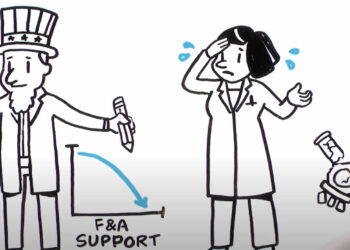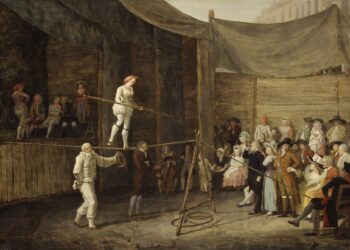
In a keynote at the recent Professional and Scholarly Publishers (PSP) annual conference, based on his acclaimed book “Race for Relevance: Five Radical Changes for Associations,” Harrison Coerver questioned whether learned and professional societies can continue to attract members – especially younger ones.
Certainly, many societies have an aging membership and/or are experiencing membership decline. But is it really true that young scholars aren’t interested in joining the associations that have, for decades, been at the heart of the communities they support? A recent survey we carried out of Wiley’s young scientists’ advisory group – though small – suggests otherwise.
About 140 of our young science advisors responded to a September 2012 survey about societies. Over 50% of the respondents are based in North America, although 16 other countries were also represented. Likewise, over 50% are working in life sciences but respondents also came from other disciplines including physical sciences & engineering (13%), health sciences, and chemistry (both 11%), among others. Most (over 70%) have between two and 10 years of research experience, typically in an academic setting (79%). And, encouragingly, the vast majority of respondents (87%) currently belong to at least one society relevant to their research – in fact, 25% belong to three or more. Their reasons for belonging are much as you’d expect: attending the society’s conferences (rated 4 or 5 by 75% on a scale where 5 is extremely important), networking with other members (63%), and the quality of the society’s publications (55%) all scored well. Least important were publication discounts (23%), access to the society’s newsletters (30%), and public outreach activities (33%).
The two main reasons given by respondents who do not belong to a society, which included those who plan not to renew their current membership(s), were the high cost of membership dues (41%) and a perceived lack of membership benefits (39%). Researchers with less than five years experience were more likely to cite high membership dues as a reason for not joining/renewing (33%) than those with five to 10 years (24%), while more experienced researchers were more likely to cite a lack of member benefits as a reason (29% for researchers with five to 10 years experience compared with 15% for those with less than five years). There were no substantial differences by discipline, though researchers in physical sciences (including earth sciences and chemistry) and engineering were most likely to cite a lack of member benefits as their reason (38% and 34% respectively, compared with 20% for researchers in health and life sciences).
But the big surprise – and clearly refuting Coerver’s prediction – is that an overwhelming majority (78%) believe that societies will continue to be at least as relevant as they are today, if not more so, over the next 10-20 years, with 14% stating that they will be much more relevant, 23% that they will be somewhat more relevant, and 41% that they will be about the same. Even more surprising – the younger/less experienced scientists are most optimistic about the future of scholarly societies, with over 50% believing they will be more relevant or much more relevant, and close to 90% believing they will be as relevant, more relevant, or much more relevant. Interestingly, support drops off among respondents with five to 10 years’ experience, only 28% of whom believe scholarly societies will be more relevant or much more relevant, though this climbs to 70% when you include those who answered ‘about the same’.
Respondents with 10+ years’ experience were somewhat more optimistic, with 40% believing that societies will be more or much more relevant and 45% that they will have about the same relevance.
As always, the free text comments make the most interesting reading, with lots of thoughtful – and thought-provoking – suggestions. In answer to the question, “what are some things that today’s societies could do in order to drive innovation and better engage their members?”, respondents suggested a range of options. Among the most popular were various forms of support for early career scientists such as mentorship, networking opportunities both with their peers and with more experienced scientists, events and sessions specially for young researchers, and better use of social media (though as one respondent, put it, “Greater and applicable social media interaction. Not just interaction for the sake of interaction.”)
Encouragingly, many young scholars want to get more actively involved in their societies – something which makes perfect sense when seen from the perspective of this respondent:
One of the best things for my career has been being appointed to committees and elected to offices in my professional society. As an early career physicist (so I am talking about the APS and AAPT) this is something that has distinguished me from my peers, made me more attractive to employers, and established me firmly in the profession. Outside of the impact I have been afforded on my profession, I also have been able to network with many respected members of my society and this has helped me get more invited talks and seminars (which makes me seen and respected by even more people).
Of course, this is just one small survey and more research into what young scholars want and need from their professional associations is neccessary. But these results do seem to indicate that societies are far from irrelevant to early career scholars and that many of them hope and expect that they will continue to be valued in future. Learned societies and their publishers have a great opportunity – if they are willing to invest accordingly – to evolve into organizations that are genuinely meaningful and valuable to future generations.
For me, this response from one of the young scholars sums it up:
I don’t think that a society will ever drive innovation, and quite the opposite, should serve to simply support its members – the people who are realistically poised to become innovators. Engaging the membership is tough. I’ve seen a tremendous investment in social media platforms from a number of societies in the past two years that I, personally, feel is a complete waste…. I’m much less interested in a society for constant contact for feel-good and belonging than I am for actual return on (what can in some cases be a hefty) investment. I delete my “home” society’s weekly update email without reading 99% of the time, but read another’s daily update each morning like religion. One is an obvious and feeble attempt to reach out from a consultant-driven strategic plan, and the other actually provides me with useful information. A society will engage a lot more, possibly with less, if it actually gives something useful back to the member.
There’s no room for complacency for those of us involved in scholarly societies. Whether as publishers, professional staff, board members, or volunteers, we need to act and we need to act fast to ensure we stay relevant to the next generation of researchers. But the good news is that, if this research reflects wider opinion among young scholars and scientists, then it’s not yet too late.
Discussion
10 Thoughts on "Are Scholarly Societies Still Relevant to Young Researchers? Perhaps Surprisingly, Yes They Are"
an overwhelming majority (78%) believe that societies will continue to be at least as relevant as they are today, if not more so, over the next 10-20 years
Based on your survey (or personal experience), what do you think is the basis of young researchers’ optimism for a bright future for societies? Clearly, access to a publication–the standard benefit for most members–is not a driving cause. What do these young researchers see that many of us do not? Could the survey prime the respondent to give a positive outlook or are they acquiescing to the desired response of the survey taker (acquiescence bias)?
Please don’t take this as being overly-critical. For me, the results are counter-intuitive and I don’t see HOW or WHY young researchers would respond that way.
It’s a very valid question Phil – I was surprised too! The brief answer is that we need to do some more in-depth, qualitative research to find out more about this. If I had to hazard a guess I’d suggest that perhaps they are either being encouraged by or emulating their advisors/managers or mentors, many of whom I expect are actively involved in their communities via societies. We certainly see this to some extent in our own organization (SSP) I think. But that is pure speculation on my part! I hope we can expand this research in future to make it both broader and deeper in future and will report back in more detail then…
And how much is down to the fact that there isn’t yet a viable alternative so they can’t see anything that will be more relevant than what currently exists? But things can change quite quickly.
But perhaps a viable alternative won’t be needed if societies themselves can adapt so that they continue to be relevant in future Martin? It seems to be that they have a great opportunity to do so.
The data suggests that the answer is in meeting peers and becoming known thereby, that is in conferences and networking, not reading publications. It is easy to see how this is a primary concern for younger scholars. That this will become more important makes sense in our iffy environment. Times are tough.
What this touches on is that science is a highly social activity, more than is often realized. Many scholars go to a lot of meetings and the Internet appears not to be changing that. This suggests society strategies like regional and local chapters, specialized meetings such as on emerging fields, etc. It seems that Society means just that –> society. What a surprise!
This is very interesting, Alice. The quotes you presented persuade me that at heart joining a scholarly society fills a need to connect, to identify, to learn, and to network. Twitter and Tumbler are fun and interactive, but sharing a meal and a conversation in person at a scholarly meeting is hard to replicate.
Readers may also be interested in Kent’s take on Coerver’s book from last year: http://scholarlykitchen.sspnet.org/2012/06/18/the-challenged-association-remaining-relevant-requires-more-than-cosmetic-change/



